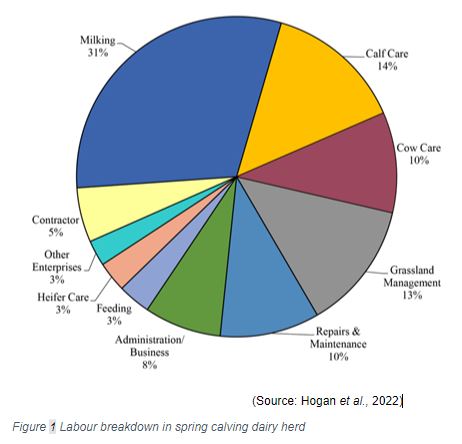Dealing with labour shortages on dairy farms
15 August 2023Farm labour represents a major cost in dairy enterprises and is increasingly becoming a key challenge facing dairy farmers. Research by Arla (2022) has suggested that half of UK dairy farms are finding it increasingly difficult to recruit staff, blaming the loss of free movement of EU workers following Brexit, and worsened by the pandemic, presenting a 12.2% vacancy rate. Here are a few ways to cope with labour shortages.
Invest in infrastructure and technology
There is a range of technology which can help with reduced labour on farm, including technologies for milking practices and calf rearing, which are typically the most time-consuming tasks (figure 1). Milking accounts for between 31% and 57% of labour time spent on dairy farms. Research has found that investing in robotic milking has labour savings of 20% on average, however this may only be a viable option when the current milking parlour is dated and requires investment.
Automated calf feeders are becoming more common in improving calf care labour efficiency. Research shows that automated calf feeders save over one min/calf per day when compared with conventional teat feeding systems (Sinnott et al., 2021). Labour demand can also be reduced through heat detection technology which in addition offers early detection of animal health issues.

Use contractors
Using contractors is a good option on farm as it allows for efficient completion of farm tasks without the need for extra farm machinery or staff. Research has concluded that using contractors for jobs such as slurry and fertiliser spreading does not have a large negative effect on farm profitability. Contractors typically have more efficient technology which in turn reduces time spent on tasks and allows labour to be allocated to other jobs. The downside of contractors is their availability at critical times e.g. silaging.
Staff packages
While pay is important to gain and retain staff, with an Arla survey showing that on average dairy farmers have had to increase pay for their workers by 22% since 2019, there are other important factors. Staff are calling for more attractive working hours and more time off. Farmers could look to employ two staff to do a 30-hour week, as opposed to one doing a 60-hour week. Offering a package to staff which includes training opportunities is likely to benefit the farm through improved performance and an increased chance of retaining the staff.
Herd size
Arla research concluded that 4.3% of dairy farmers have reduced the number of milkings, and 6% said they have reduced the number of animals because of staff shortages. If nothing changes within the next year another 6.9% (reduced milkings) and 6.8% (number of animals) will take this step. Scaling back so the herd size and production is realistic for the current staffing level is an option.
On average milking two times a day as opposed to three will result in a saving of £18,000/year in labour. A farmer in the Midlands found that cutting back to twice a day milking resulted in better retention of staff, improved health and welfare of cows, a lower vet bill and only a small change to milk output (three times a day 11,000 litres at 3.20% protein and 3.75% fat v. two times a day 10,107 litres at 3.39% protein and 4.28% fat) (ForFarmers, 2019). It is worth noting that reducing herd size and output will mean that there is less output to spread fixed costs over e.g. rent, contracting costs.
Key steps to alleviate labour shortages on dairy farms:
If you have a labour shortage on your dairy farm, it’s important to consider the following four things.
- Consider the viability of technology to increase automation and reduce reliance on staff.
- Opt to use contractors, particularly during busy times of the year.
- Staff packages should be desirable to encourage recruitment and retention.
- Consider reducing herd size and/or output to fit current staffing capacity.
References available upon request.
olivia.ward@sac.co.uk; 01539 769059
Sign up to the FAS newsletter
Receive updates on news, events and publications from Scotland’s Farm Advisory Service
